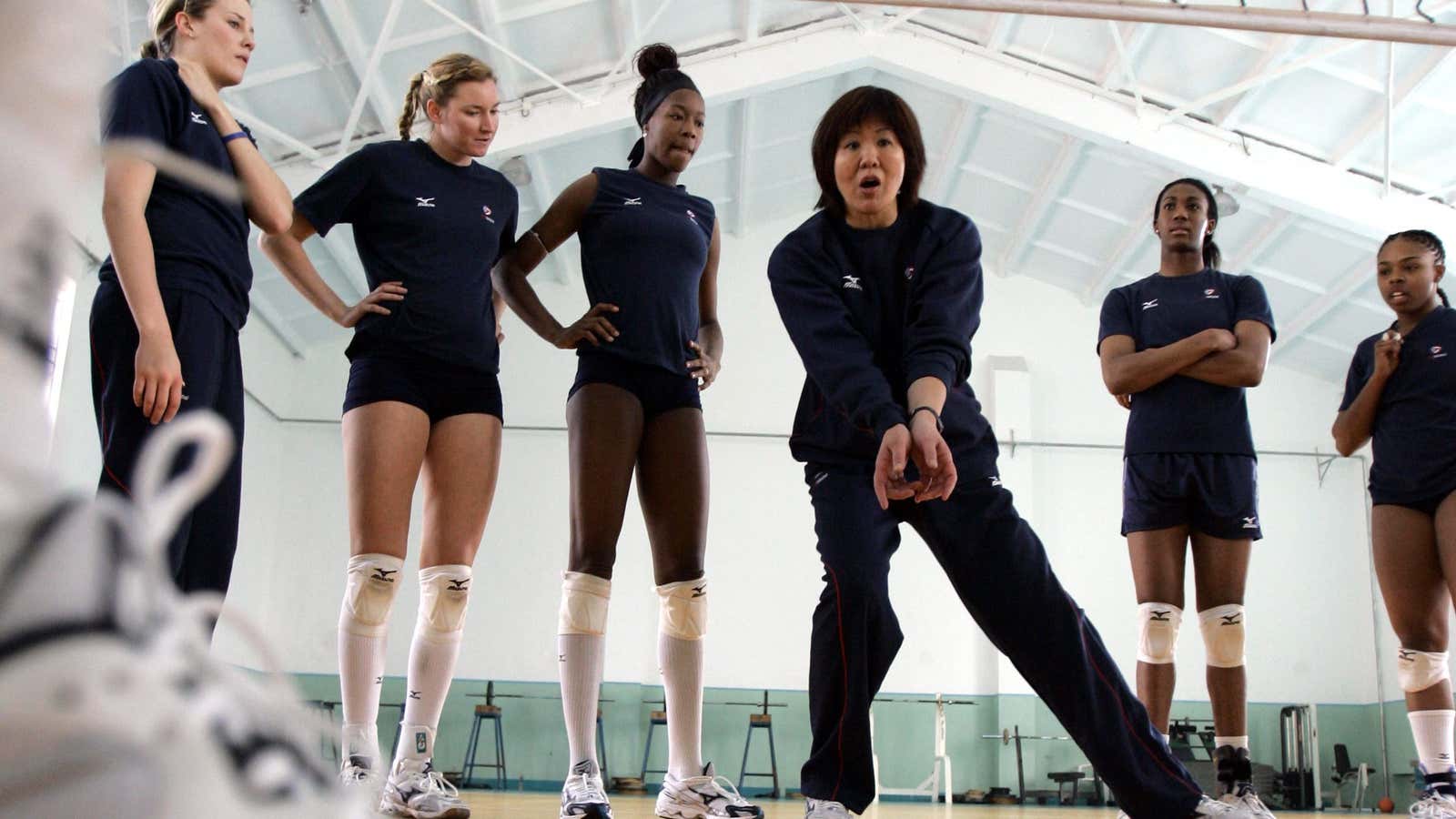You’d be forgiven for thinking that the only thing that mattered to China in this year’s Olympics was winning the women’s volleyball competition.
After a worse-than-anticipated medal tally at Rio, with Team China finishing in third place below Great Britain, all seemed well again after China on Saturday (Aug. 20) took home its 26th gold in a 3-1 victory over Serbia in women’s volleyball.
The victory was a huge moment for China. Its women’s volleyball team had been the best in the world, particularly during its golden age in the 1980s, but has faltered in the past decade or so. Topping the Olympic podium again after 12 years, China became the only three-time Olympic gold winner in the sport other than Cuba. The final drew TV ratings of 57% in China.
Chinese fans are celebrating the volleyball team’s head coach Lang Ping, who led the Chinese team between 1995 and 1998 and has again since 2013. Lang herself was a volleyball legend during her career as a volleyball player. Nicknamed the “Iron Hammer,” the 56-year-old former ace spiker led China to four world titles in the 1980s, including an Olympic gold in Los Angeles in 1984, beating the American hosts in the final. Since then, Lang has become a national heroine, with her portraits appearing on postage stamps, while the women’s volleyball team is seen as a symbol of teamwork and persistence. The term “women’s volleyball spirit” is even used by Chinese authorities in their propaganda.
With China’s victory over Serbia, Lang also became the first person in the sport to win Olympic gold as both a player and a coach.
But just a few years ago, Lang was a controversial figure in her home country. She served as the head coach of the US women’s volleyball team between 2005 and 2008, during which time she guided the team to defeat China in the preliminary round at the 2008 Beijing Olympics. The US went on to win a silver medal. Some nationalistic Chinese internet users accused her of being a ”traitor” at the time. Among the most prominent critics was China’s Go world champion Nie Weiping. Before the US-China face-off, Nie sent a public message to Lang: “Never forget you’re Chinese.”
After retiring as a player in the late ’80s, Lang began her coaching career with the University of New Mexico while majoring in sports management as a postgraduate. Later she went on to coach professional teams in the US, Japan, and Italy. At the time, many Chinese people couldn’t accept that the pride of their country chose to serve teams overseas, state-backed tabloid Global Times noted.
Today, coaching foreign teams is still a sensitive topic in China.
Liang Chow, a former captain of the Chinese gymnastics team in the 1980s, became a US citizen in 2002 and later won two Olympic golds for the US. He trained Shawn Johnson—winner of the women’s balance-beam contest at the 2008 Beijing Olympics—then helped US gymnast Gabrielle Douglas to win gold in the women’s individual all-around event in 2012 in London. When asked whether his Chinese nationality posed difficulties for him, Chow said (link in Chinese), “Sports are international, it doesn’t belong to any single country.”
Badminton coach Li Mao, a former Chinese national team player, had coached shuttlers in South Korea, Indonesia, and Malaysia, including Malaysian world champion Lee Chong-wei. Under Li’s tutelage, South Korean shuttle player Lee Hyun-il beat the world’s top player, China’s Lin Dan, at the Korea Open in 2008. Li was criticized as a traitor (link in Chinese), reported the Shanghai-based newspaper Oriental Daily.
It seems that in Lang’s case, all has been forgotten and forgiven. Writing on Weibo, China’s Twitter equivalent, Lang praised the Chinese women’s team for “their sweat and sacrifice” and thanked the “women’s volleyball spirit that is passed down through generations.” The post attracted over 950,000 likes.
For the Chinese state, Lang’s career—even her overseas stint—can now be wholly embraced without awkwardness.
“Lang is uniquely positioned because she succeeded in China, understands the Chinese system, and enjoyed a successful overseas experience,” Ren Hai, an Olympic studies expert at Beijing Sport University, told the Global Times. ”Her story shows that the state, the market, and society are three important factors in the development of sports.”
